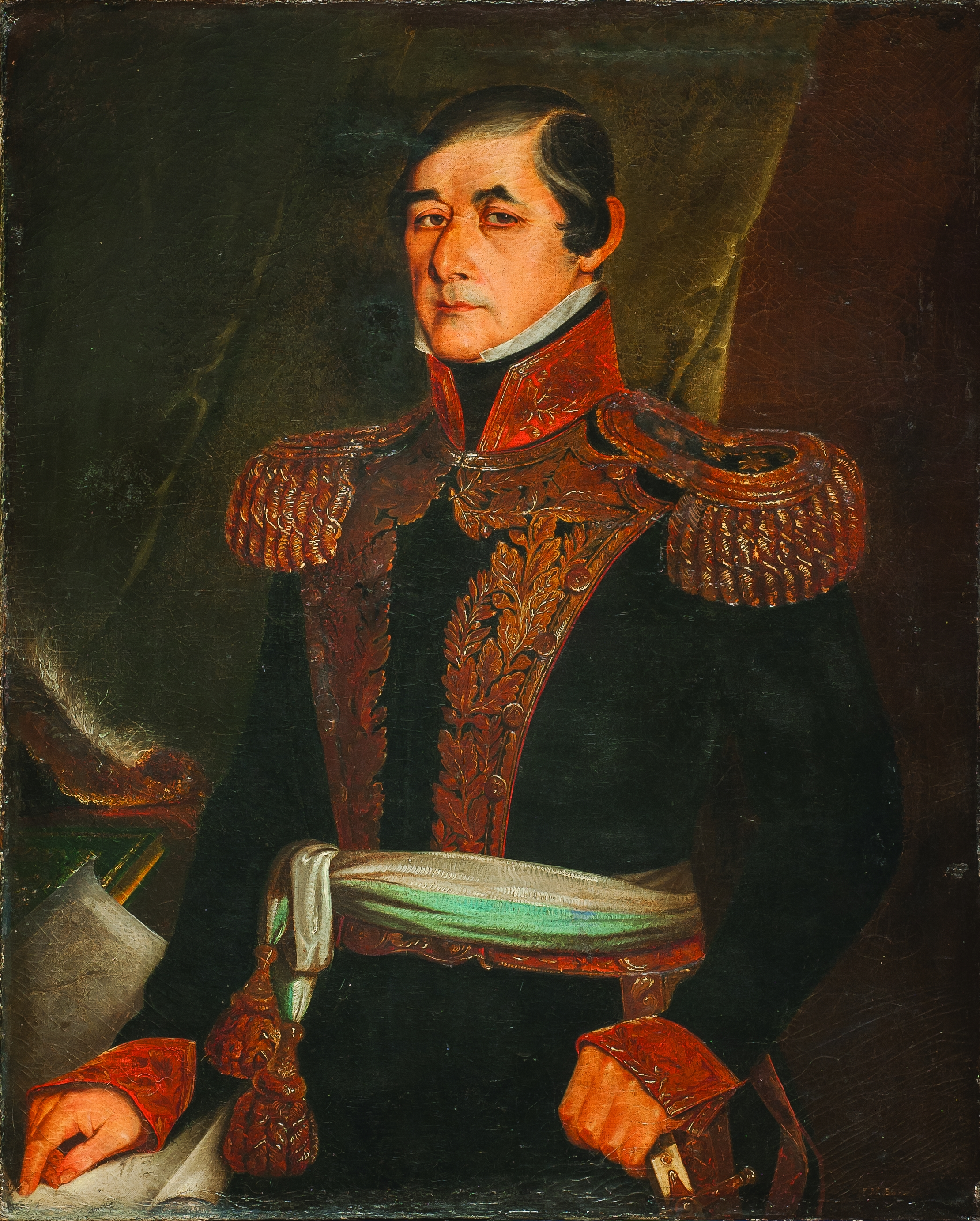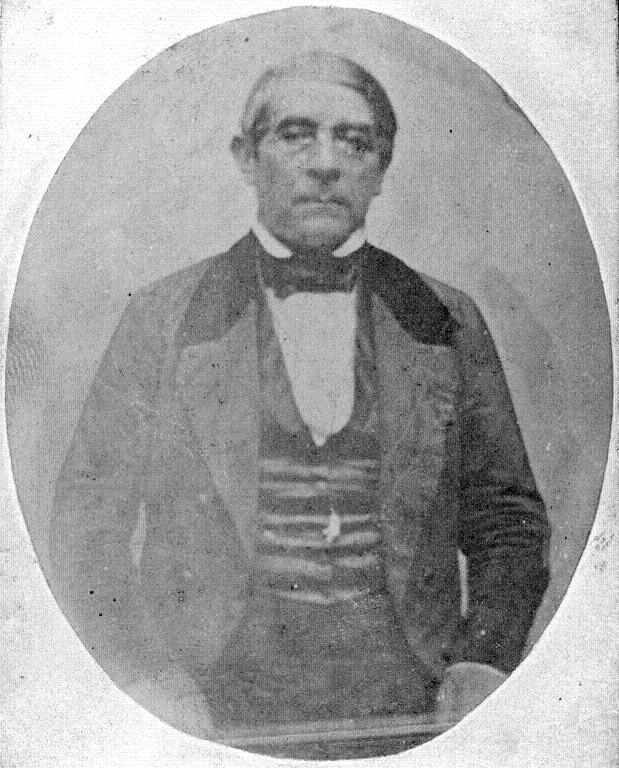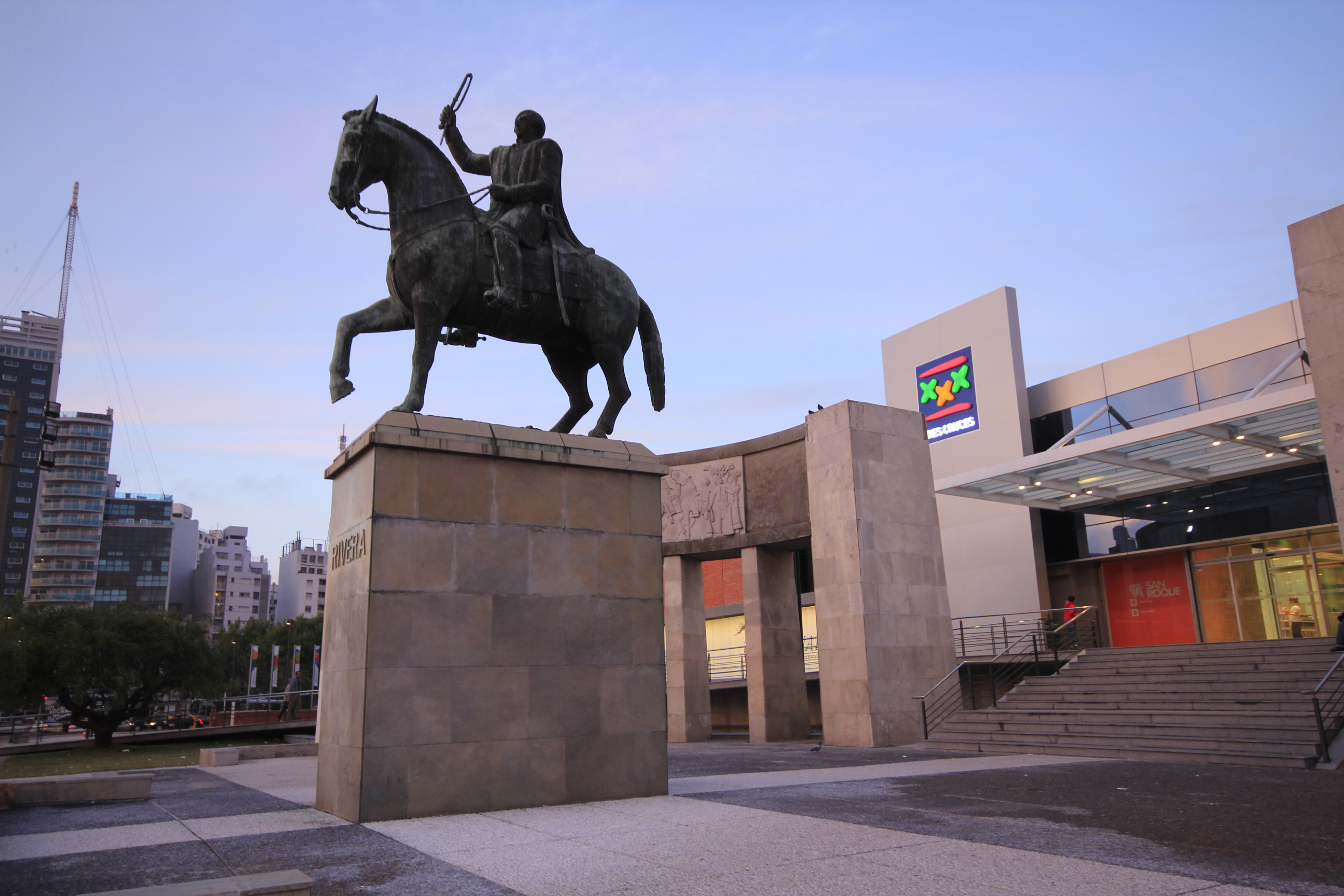1. Overview
José Fructuoso Rivera y Toscana (1784-1854) was a prominent Uruguayan general and patriot who played a crucial role in the Banda Oriental's liberation from Brazilian rule. He served three terms as President of Uruguay and is recognized as a key instigator of the prolonged Uruguayan Civil War. Rivera is also credited with founding the Colorado Party, a political force that dominated Uruguayan politics for nearly a century. However, his legacy is marked by significant controversy, most notably his involvement in the 1831 Massacre of Salsipuedes, an event that led to the near-total extermination of the native Charrúa people. This act, alongside his political struggles and contributions to nation-building, shapes his complex historical assessment, which includes both praise for his leadership in securing independence and criticism for his authoritarian methods and human rights abuses.

2. Early Life and Military Career
José Fructuoso Rivera was born on October 17, 1784. Prior to his military career, he worked as a rancher. In 1810, he joined the army led by José Gervasio Artigas, a pivotal figure in the independence movement of the Banda Oriental. Rivera quickly distinguished himself through his military capabilities and steadily rose through the ranks, eventually achieving the position of general. Following the occupation of the Banda Oriental by the United Kingdom of Portugal, Brazil and the Algarves and the subsequent exile of the defeated Artigas in 1820, Rivera chose to remain in the newly established Cisplatina province, which was under Brazilian control.

3. Role in the Independence Struggle
Rivera played a significant role in the struggle for liberation from Brazilian dominance. His involvement began when he met Juan Antonio Lavalleja in 1825, an encounter known as the Abrazo del Monzón (Embrace of the Monsoon). In the same year, the Thirty-Three Orientals, led by Juan Lavalleja, initiated their fight against the Empire of Brazil with support from Argentine forces. Rivera joined these efforts, though historical accounts differ on whether his participation was voluntary or compelled.
Regardless, he quickly established himself as a vital military commander during the ensuing Cisplatine War. He participated in several crucial engagements, including the Battle of Rincón and the Battle of Sarandí, both of which were significant victories for the independence forces. Despite these successes, his relationship with other leaders became strained, leading him to leave the country for a year. Consequently, he was absent from the pivotal Battle of Ituzaingó in 1827.
4. First Presidential Term
After Uruguay declared its independence in 1828 following the Treaty of Montevideo, internal political tensions escalated into open conflict between Rivera and Juan Antonio Lavalleja. In this tumultuous period, Argentine general José Rondeau was appointed as the first provisional Governor. Rivera ultimately assumed the presidency for his first term, serving from November 6, 1830, to October 24, 1834. During his tenure, he navigated the complex political landscape of the newly independent nation. Upon the conclusion of his term, Rivera endorsed General Manuel Oribe as his successor to the presidency, signaling a period of initial cooperation between the two leaders.
5. Political Conflicts and Second Presidential Term
Following his first presidential term, Rivera's relationship with Juan Antonio Lavalleja and his former protégé Manuel Oribe deteriorated, leading to escalating political conflicts. This period marked the foundational split that would define Uruguayan politics for decades, giving rise to the distinct political divisions between what would become the Colorados and the Blancos. The origins of these parties are symbolically traced to this conflict, as Rivera's supporters adopted red armbands as their distinguishing mark, while Oribe's followers wore white. These early factions later formalized into the respective political parties.
In October 1838, the conflict culminated when Rivera defeated Oribe, forcing him into exile in Buenos Aires. Following this victory, Rivera commenced his second presidential term, which lasted from March 1, 1839, to March 1, 1843. This period was characterized by continued political instability and the groundwork for the major civil unrest that was to follow.
6. Uruguayan Civil War and Exile
The political conflicts between Rivera and Oribe intensified with the support Oribe received from Buenos Aires strongman Juan Manuel de Rosas. Oribe organized a new army and invaded Uruguay, thereby initiating the protracted Uruguayan Civil War, also known as the Guerra Grande. In December 1842, Oribe achieved a decisive victory over Rivera at the Battle of Arroyo Grande.
This defeat significantly curtailed Rivera's authority, effectively limiting his power to the capital city of Montevideo, which then faced the prolonged Great Siege of Montevideo by Oribe's forces. Oribe, in contrast, established control over the rest of the country. By 1847, the situation for Rivera became untenable, and he was compelled to seek exile in Brazil, where he remained until 1853. His absence marked a period of significant political upheaval in Uruguay, with the civil war continuing to rage.
7. Final Return and Death
In 1853, a turning point occurred in Uruguayan politics with the overthrow of President Juan Francisco Giró. This event paved the way for Rivera's return to the country. On September 25, 1853, a ruling triumvirate was established to govern Uruguay, comprising Rivera, Juan Antonio Lavalleja, and Venancio Flores. This collective leadership was intended to stabilize the nation after years of civil strife.
However, this new arrangement was short-lived. Lavalleja passed away on October 22, 1853. Just a few months later, on January 13, 1854, Rivera himself died while en route to Montevideo. His death left Venancio Flores as the sole remaining member of the triumvirate, thereby consolidating power in Flores' hands. Rivera's final return to a leadership role was brief, but it underscored his enduring presence in Uruguayan political life until his last days.
8. Major Controversies
Throughout his life, José Fructuoso Rivera was involved in several significant controversial decisions and actions that have drawn ethical and societal scrutiny, particularly when viewed from a critical perspective concerning human rights and social justice.
8.1. Massacre of Salsipuedes
The most profound and widely condemned controversy associated with José Fructuoso Rivera is the 1831 event known as the Massacre of Salsipuedes. This incident involved the calculated and brutal extermination of the native Charrúa people, the indigenous inhabitants of Uruguay. The background to this event was the newly independent Uruguayan government's desire to expand its territory and consolidate its authority, which brought it into conflict with the Charrúa, who resisted assimilation and continued to live according to their traditional customs.
Rivera, as the then-President, orchestrated a meeting with the Charrúa leaders under the guise of negotiating a peace treaty and integrating them into Uruguayan society. However, this was a deceptive maneuver. At a location called Salsipuedes, the Charrúa were surrounded by Rivera's troops. The ambush resulted in a massacre, with a significant number of Charrúa men, women, and children killed. The survivors were often captured, and many children were taken to be raised in Uruguayan households, effectively eradicating the Charrúa as an independent cultural and ethnic group within Uruguay.
The impact of the Massacre of Salsipuedes was devastating and profound, representing a catastrophic loss of indigenous life and culture. It effectively eliminated the Charrúa as a distinct people in Uruguay, leading to their near-total extermination. This event is widely remembered as a dark chapter in Uruguayan history, a severe violation of human rights, and a stark example of state-sponsored violence against indigenous populations. It remains a subject of considerable historical debate and regret, highlighting the ethical ramifications of nation-building processes that disregarded indigenous populations.
9. Founding of the Colorado Party
José Fructuoso Rivera is widely recognized as the pivotal figure in the establishment of the Colorado Party. This political entity emerged from the factions that supported Rivera during his intense political conflicts with Manuel Oribe in the late 1830s, distinguished by the red armbands worn by Rivera's followers. The party formally coalesced from these early allegiances and rapidly grew to become a dominant political force in Uruguay. The Colorado Party went on to govern Uruguay without interruption for an exceptionally long period, from 1865 until 1958, shaping much of the nation's political, economic, and social development for nearly a century. Its enduring influence underscores Rivera's foundational role in Uruguayan party politics.
10. Legacy and Historical Assessment
José Fructuoso Rivera's legacy in Uruguayan history is complex and multifaceted, marked by both his instrumental role in achieving independence and nation-building, and by controversial actions that have drawn significant criticism.
10.1. Political Legacy and 'Riverista' Tendency
Rivera's enduring political influence is particularly evident within the Colorado Party, where a distinct 'Riverista' tendency has long persisted. This faction, represented by figures such as Jorge Pacheco Areco and members of the Bordaberry family, emphasizes strong personal leadership and a particular interpretation of the party's foundational principles. The 'Riverista' tendency often stands as a counterpoint to other factions within the Colorado Party, such as the 'Batllista' current, reflecting the diverse ideological streams that trace their origins back to the early days of Uruguayan politics. His style of leadership, characterized by both military prowess and political maneuvering, deeply imprinted itself on the party he founded.
10.2. Overall Historical Assessment
Rivera's historical assessment encompasses a range of perspectives. On one hand, he is lauded for his significant contributions to Uruguayan independence and the early formation of the nation-state. His military leadership during the liberation from Brazilian rule and his role as the first constitutional president are often highlighted as pivotal to Uruguay's sovereignty. His efforts to establish a national identity and a political system, despite their flaws, laid groundwork for the developing republic.
On the other hand, a critical assessment of Rivera's life and actions reveals deeply controversial aspects, particularly concerning human rights and the instigation of profound social and political divisions. The Massacre of Salsipuedes, where the indigenous Charrúa people were virtually annihilated under his command, stands as a severe stain on his legacy, representing a clear instance of state-sponsored violence and ethnic cleansing. His involvement in the Uruguayan Civil War also cemented deep rifts between the Colorado and Blanco factions, leading to decades of internal conflict and instability.
Historians often grapple with the duality of Rivera as both a national hero who secured independence and an authoritarian figure whose decisions had devastating consequences for indigenous populations and fostered persistent political strife. His actions illustrate the complex ethical challenges inherent in the formation of modern states, where the pursuit of national consolidation sometimes came at a significant human cost.

11. See also
- Politics of Uruguay
- Colorado Party (Uruguay)